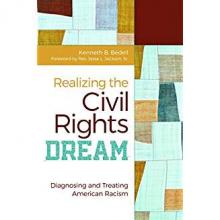Faculty and students gathered at the Berkley Center on Oct. 12th for a discussion with Kenneth Bedell, who explored questions of American race relations and sociology in his newest book, “Realizing the Civil Rights Dream: Diagnosing and Treating American Racism.”
The event began with an introduction from the center’s associate director for programs, Melody Fox Ahmed, followed by a presentation and a discussion.
Bedell began his presentation establishing his civil rights goal as the ability for people of all races and ethnicities to take part in American life. This goal, he said, remains elusive in American society, and that is the issue which he tackled in his newest work.
Bedell is a minister, research fellow at the Berkley Center, and a former senior advisor in the U.S. Department of Education’s Faith-Based and Neighborhood Partnerships Center under the Obama Administration. He has been actively involved in American interfaith dialogue and interracial relations since the mid-80s. Bedell said he became interested in issues of race when he denounced the Ku Klux Klan in a local Maryland paper and experienced harassment and threats for years afterward.
The minister explained American societal issues of race through a complex set of relations called the “White Paradigm” and the “Patchwork Paradigm,” blaming the former for continued racial injustice in America. Bedell described how these paradigms define institutions, individual behavior, and societal racism as being cyclical and connected.
“Traditional Marx, and Durkheim, and Weber took us down a path of, ‘society creates the way we are’ (…) and social psychologists and sociologists since the 1950s have shifted that around to say, ‘no, this is circular’, ” Bedell said.
Bedell drew the example of the popular Kipp Charter Schools, which he claims impose white values on non-white families, perpetuating the White Paradigm.
“They establish a form of discipline that basically says, ‘your black culture or your Hispanic culture is going to lead you into failure, and you need to adopt this other white paradigm in order to go to college,’” Bedell said.
As such, Bedell recommended a series of reflections and experiments within society in search of a new paradigmatic shift which would grant all citizens the participation they deserve.
“The first step is to identify the failures of the current paradigm,” Bedell explained.
Following his presentation, Bedell received questions from participants. One attendee asked Bedell what he thought of Georgetown’s policies around race and equality. Bedell mentioned the university’s continued and successful efforts to increase graduation rates for minority students, but took issue with the nature of those efforts.
“A lot of the work that schools are doing in order to raise the graduation rate of non-white students is just to raise the graduation rate but not to make the non-white communities full participants in what’s happening at the institution,” said Bedell, referencing the words of a colleague he met at a convention for the Association for the Study of Black History and Life.
Andrea Su (SFS ‘2019), who attended the event, said she was pleasantly surprised by the length and candor of the discussion.
“I was really surprised at how much of an open discussion the Q&A section was. It was awesome to be able to engage in one discussion a reverend, a sociologist, and a handful of professors and students in some really raw and challenging questions on racism and racial injustice in this country,” Su said. Su hopes more opportunities like this one will come to Georgetown.
”I would like to see more open discussions like this, where people are willing to be both honest about themselves and respectful of others, on our campus,” she said.
Bedell also looked to the future, posing broader questions about America’s future progress.
“[The question] becomes not, ‘how are we going to take power from each other,’ but ‘how are we going to share?”





 Contact Us
Contact Us